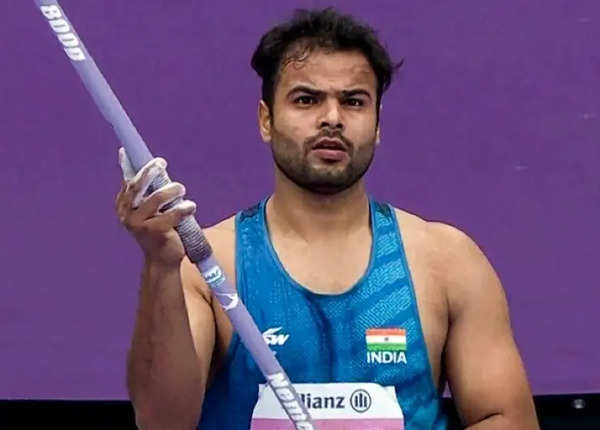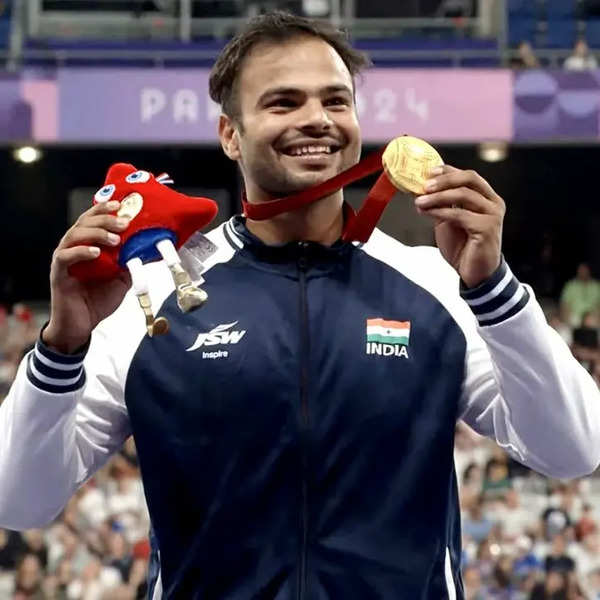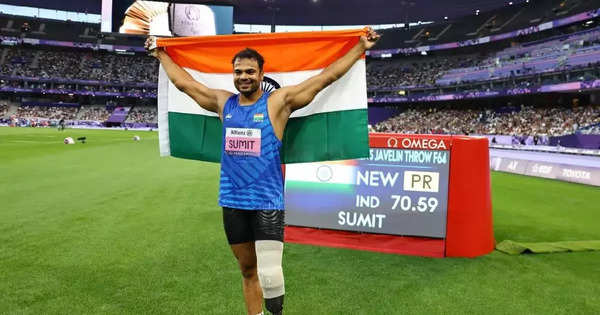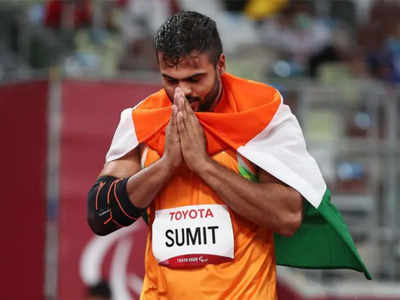Sumit Antil, a two-time world champion and Paralympics gold medallist in Tokyo, promised Prime Minister Narendra Modi he would add to his tally in Paris. In September, he did just that. By hurling the javelin a distance of 70.59m in the F64 class in the French capital, winning a gold medal as a result, he became the first Indian male para-athlete to defend his Paralympics title.
The evening in Paris was milestone-filled for the Sonipat-born para-athlete.He shattered his own Paralympic record (68.55m) with the first throw (69.11m). In the second throw, and eventually his best, he went 70.59m. He never saw his quest to win a gold medal be challenged. And yet, this wasn’t even his best. His personal best, and the world record, stands at 73.29m, which he achieved at the Hangzhou Para-Asian Games.
His sensational record-collecting and medal-winning spree has understandably drawn comparison with Tokyo Olympics gold medallist and Paris Olympics silver-winning Neeraj Chopra.
As Sumit chases 80m and Neeraj 90m in their respective fields and categories, the two javelin throwers are weighed together. The 26-year-old thinks the comparisons are flattering but “silly”.
As the euphoria around the Paralympics and the sundry events, including an appearance on Kaun Banega Crorepati, die down, Antil is raring to get back to training and fix the issues he identified in Paris.
In an exclusive conversation with TimesofIndia.com, Antil spoke about the Paris Paralympics, injury concerns, mental preparation for a tournament of such scale, his accident and how para-sport can continue to be promoted.
You won a medal, broke the Paralympic record. How does it feel?
It feels really good, and I’ve gained motivation for future tournaments that if we can defend a title once, we can do it again and again. We’ve maintained the standard of winning a gold since 2021. We will try to maintain it as much as we can going forward.
It has been a month now since the Paralympics. Has the process of looking towards the future begun?
Absolutely, the celebration has happened, and we’ll try to get back to the ground as soon as possible. The respect and love we are receiving for our work, we want to keep that going. We’ll try to perform even better in the upcoming tournaments. Looking back at the videos from previous tournaments, we have realised there is still a lot of work to do. There are many mistakes we can correct, and that can help us improve.

Javelin thrower Sumit Antil.
What mistakes have you noticed after the Paralympics?
There are quite a few technical shortcomings. I think during the Asian [Para] Games, where I set the 73-meter world record… the track conditions this time felt a bit soft. We’ll try to improve on that. I felt that my balance was off at times as my body was leaning to the left. We’ll try to correct those shortcomings and push our limits as much as we can to realise our potential.
One thing that was different this time was the track speed. How does an athlete adjust to that? How can they improve?
This time, the speed of the track was a factor, and since I’m a power thrower, controlling speed plays a major role in my performance. However, I felt that this time, my attacking line was coming too quickly, or I wasn’t able to feel the runway. But it was a great tournament with a wonderful atmosphere in Paris. The crowd support was really good. Competing in front of such a great crowd was exciting, and they were motivating me with every throw. It was a completely different feeling.
What was the mental and physical preparation like before the Paralympics, and how did you maintain it throughout the period?
I think after a certain point, your physical preparation come to an end because you’ve already done the necessary work. In the last five-to-seven days, you feel a lot of mental pressure since everyone will be watching you and everyone has expectations. I think that’s where your mental strength matters a lot. The support of your team is also crucial; the vibe of your team matters, whether it’s positive or negative. I feel quite blessed to have such a team with such positive vibes. They never say negative things, and we were confident that we had prepared well on the ground.

At the 2024 Paris Paralympics, India set a benchmark with a record-breaking 24 medals, including that by Sumit Antil.
So, what does your mental preparation involve? What does it consist of?
Well, mostly we try to control our breath through yoga and meditation because when the body is nervous, blood pressure tends to increase. But it’s also important because the higher your blood pressure, the more energy will flow into your muscles, activating them. However, if it goes too high, it can be problematic. That’s why athletes always try to control their breathing through yoga or meditation. Before Tokyo, I even took psychological classes because it was my first major tournament, and I felt quite a bit of pressure. However, this time, I didn’t feel that much need. Yes, I did yoga and meditation quite regularly this time.
You mentioned somewhere that you watched Bhaag Milkha Bhaag a day before. Is this movie choice pre-meditated, like you’re aware it’s about a legend and that gives you more motivation? Is that your thought process, or is it random?
No, I mostly like to watch such movies. They give a bit of motivation, like 83. It’s based on the cricket World Cup, and then there’s Bhaag Milkha Bhaag. I haven’t seen Chandu Champion yet; I just haven’t found the time, but I’ll try to watch it too. Although it released earlier, our schedule was so strict at that time that we couldn’t watch it. But I really like movies that are based on real-life events where someone has done something exceptional, something out of the ordinary.
For sure, Bhaag Milkha Bhaag is one of my favourite movies, and I mostly watch Reels related to it if they come up by chance, reminding me of good movies. If I have some free time, I’ll watch those. But for sure, they provide a lot of motivation, especially at times when you have competitions.
Speaking of your accident, I wanted to know which sports you tried at the time, and what did you like about javelin?
I tried three sports – discus throw, shot put and javelin. But somewhere, I feel that javelin chose me because when seniors were throwing, I was watching and thinking about which game would be significant when you have to make a decision. So, when javelin started, it felt quite good. I think that’s why I chose javelin—it’s relatively light and everyone thinks they can throw it very far quickly. But that’s not the case; it’s a very technical sport, and only when an athlete tries it do they realise why it isn’t working.
But I really like javelin, and the way it travels, an athlete can actually see their performance because it stays in the air for a long time. It’s quite fascinating and I’ve really fallen in love with javelin now; I’m quite serious about it—aiming for long throws. As a person delves deeper into the technical aspects, they get more serious, I believe.
At that time, overcoming the accident, you could no longer do many things you used to do before. How difficult was that for you at that time?
It was quite difficult because at seventeen, as a young man with two dreams—joining the army and wrestling—both of those dreams were shattered suddenly. It was a huge shock at that time. But time is the biggest healer, and eventually, you have to accept yourself as you are. It took me two years to accept myself as a para-athlete, and after that, I never looked back; I just gave my hundred percent. I’ve been playing since 2017. There have been very few instances where I took rest, and I think as my medals have been coming in, I feel like I’m getting more serious about my game. Because this time, the amount of practice I did for the 2024 Paralympic Games was unprecedented. We maintained a strict diet and schedule—whatever we could do, we did it all. Our aim is that when we go to competitions, we shouldn’t have any regrets about how we could have performed better.
So far, there has only been one occasion when, during the 2024 World Championship in Kobe, I felt I could have performed a bit better because I was injured at that time and took a bit more rest. But apart from that, there hasn’t been any instance where we’ve felt dissatisfied, even before that, that we could have done better. We know that we did as much as we could, so there’s a different level of satisfaction in an athlete’s life.
If we talk about this injury, can you tell us what the injury is and what actions you are taking regarding it now?
I have a disc injury. I think it’s called diffusion of the disc, where one layer has ruptured and the inner fluid has leaked a bit. But it might heal with strength. We are also doing physiotherapy for it regularly, and soon I’ll get an MRI to check the progress because we’ve been taking good care of it over the past year. After the MRI, I will be able to discuss with the doctors about the current status. So far, I’ve had a lot of relief; initially, I couldn’t throw at all, but now I can throw a bit, so there is definitely progress. However, we will find out how much after the MRI.
So, there’s no situation where surgery is necessary.
No, not at this point, and let’s hope it doesn’t come to that. But there are other options. For instance, there’s an injection you can get for pain relief. I don’t remember the name, but there’s also strengthening—strengthening is something that will play a significant role in life. So we will try to get back to the ground regularly from the 10th onwards. There will also be some events in between, which we will manage as well, but we need to prepare better for the upcoming tournaments.

Sumit Antil.
Regarding your comparisons, they keep happening, and they will happen with Neeraj (Chopra) as well. How do you view that comparison? Is it right or wrong? The distance will obviously be quite different, but how do you perceive that?
I think every situation has two sides. For sure, comparing Neeraj and me seems a bit silly because throwing with one leg and throwing with both legs makes a huge difference. But we take it in a healthy way, considering there was a time when people didn’t understand para-athletes at all. Nowadays, if they are comparing me directly with Neeraj, we’ve made considerable progress. When we started, the world record was 59 meters; now it’s 73 meters.
So, I feel that the progress has been quite good. The way para-athletes are performing—like one has gone up to 67 meters for silver, and another has gone up to 66 meters for bronze—the entire para-athlete community is working hard to push their own limits. I think the results have been positive in my opinion because Neeraj Bhai definitely plays an inspirational role. Whenever we are compared to him, somewhere it stays in our mind that people think we are capable, which motivates us a lot.
As a country, India and even media outlets tend to decrease coverage of the Olympics and Paralympics after the events, and people’s attention shifts away from you. How can that be changed, and how do you perceive it?
There are two things I’ve noticed. One is the regulation of competition; I’ve seen that there is a lot more competition abroad compared to domestic competitions, like nationals and everything organised by the All India Federation and the government. There are private clubs and many other things there that are lacking in India. For instance, if you look at national championships here, the stadiums are often empty, aside from cricket. I believe there is a need to raise awareness among people to support athletes. If more people come to watch, it will boost the athletes, and their performance will improve significantly.
If people will come to watch, then for sure the media will also come, and coverage will increase. So it seems that all these things depend on each other; the more people that show up, the more media coverage there will be, and awareness will grow. Even more talent will emerge, and I think identifying that talent will also become easier. If competitions happen regularly and are promoted a bit, it won’t just be a situation where media coverage spikes only during the Olympics or Paralympics.







